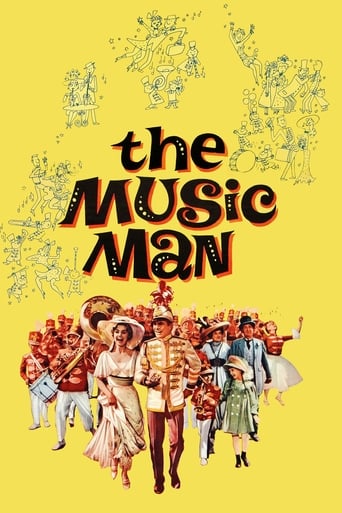The story of that man and his 76 trombones, and the wonderful, wonderful tune he played on every heart in town!
"The Music Man," a vibrant and effervescent musical released by Warner Bros. Pictures in 1962, captures the essence of early 20th-century Americana with its charming tale of deception and redemption. Set in the fictional town of River City, Iowa, the film follows the charismatic con artist Harold Hill, portrayed with magnetic energy by Robert Preston. Hill's scheme to swindle the townsfolk by selling them on the idea of a boys' band is both audacious and precarious, setting the stage for a delightful blend of humor and heart. The film's director, Morton DaCosta, skillfully navigates the balance between the comedic elements and the underlying sincerity, making "The Music Man" a timeless classic. The film's success is largely due to its unforgettable musical numbers, penned by the legendary duo Meredith Willson and Franklin Lacey. Songs like "Seventy-Six Trombones" and "Till There Was You" not only advance the plot but also showcase the talents of the ensemble cast. Shirley Jones delivers a captivating performance as Marian Paroo, the town librarian who becomes Hill's love interest, adding depth and warmth to the narrative. The chemistry between Preston and Jones is palpable, elevating the film's romantic subplot and providing a counterpoint to Hill's initial trickery. Visually, "The Music Man" is a feast for the eyes, with its meticulously crafted sets and vibrant costumes transporting viewers back to 1912. The production design, overseen by Paul Groesse, captures the quaint charm of small-town America, while the choreography, led by Onna White, brings the musical numbers to life with infectious energy. The film's attention to detail is evident in every frame, from the bustling town square to the intimate scenes inside the Paroo family home, creating a fully immersive experience for the audience. Ultimately, "The Music Man" is a celebration of community and transformation, as Harold Hill's journey from con man to genuine benefactor resonates with themes of trust and personal growth. The film's enduring appeal lies in its ability to weave together humor, romance, and social commentary into a cohesive and entertaining package. As Hill's plan unravels and he faces the consequences of his actions, the townspeople's initial skepticism gives way to unity and hope, leaving viewers with a heartwarming message about the power of music and human connection.
Año1962
Presupuesto4240000$
Duración151 minuto
Ingresos15000000$
GénerosComediaFamiliaMúsicaRomance
Países de producciónUnited States of America

